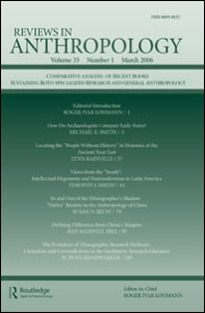
"Four-field anthropology has always struggled with the problem of how to holistically study human cultural systems that are the products of environment, process, and history. Complexity science offers a set of tools calibrated to the analysis of complex systems like those of human societies, and has the potential to allow us to scientifically understand how history and process affect the physical, cultural, and linguistic components that are entangled in the whole of human societies. Application of complexity science to anthropological problems thus far has favored engagement on a conceptual level rather than one that harnesses the full power of the approach."
As I've discussed before (e.g., in this post about the "divorce" metaphor), I'm a believer in four-field anthropology. I think the four fields are together for good reasons, and I think they should stay together. In this essay, I argue that complexity science provides a set of tools that are well-suited to addressing and perhaps resolving the tensions within anthropology that are caused by the apparent difficulty of understanding both the general (process) and the particular (history). In complexity science, we've got a set of methods and theory that actually matches the nature of the phenomena in which we are interested. In my opinion, we are a long way from really capitalizing on the potential of complexity science to address anthropological issues.
I review three books in the essay:
- Caldararo, Niccolo Leo 2014. The Anthropology of Complex Economic Systems: Inequality, Stability, and Cycles of Crisis. Lanham: Lexington Books.
- Gehlsen, Duane 2009. Social Complexity and the Origins of Agriculture: The Complex-Systems Theory of Culture. Saarbrücken: VDM Verlag.
- Mosko, Mark S., and Frederick H. Damon, eds. 2005. On the Order of Chaos: Social Anthropology and the Science of Chaos. New York: Berghahn Books.
I often feel like I should duck and cover when I publish something new. In most cases, however, the low volume of the reaction has turned out to be much more challenging than the tone of the reaction. I'm sure the thought "is anybody reading this?" is a feeling with which many academics will identify. As always, I hope this gets read and I hope it is part of a useful discussion. I'm more than happy to discuss the essay here if anyone has questions, comments, etc.


 RSS Feed
RSS Feed
